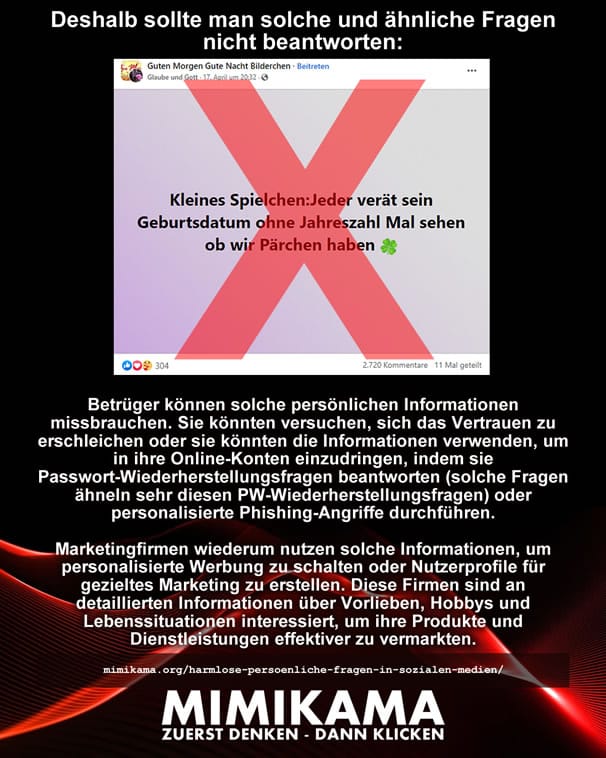Personal questions like “ What is your favorite film?” ", " What was the best trip you've ever taken? ” or “ What hobbies do you have that might surprise others? ” seem harmless at first glance and are often used for entertainment and interaction on social networks. But fraudsters and marketing companies can use this information for their own purposes.
At this point we would like to emphasize that not all “questioners” on social networks who ask such questions are dubious. Many sites use these types of questions to encourage interactions and discussions among their users. However, it is advisable to be careful and think carefully about what information you reveal on the Internet.
On the Internet, our personal information is not always safe. Cybercriminals and marketing companies use various tactics to obtain personal information from Internet users. One of the methods is to ask seemingly innocuous questions that at first glance only serve to entertain or interact. These and similar questions are:

But what information can fraudsters and marketing companies actually obtain and what role do profiling and password recovery questions play? Are all operators and creators, especially on Facebook, who ask such private questions dubious or are there also harmless backgrounds?
Misuse of personal information through harmless personal questions
Marketing companies use such information to deliver personalized advertising or to create user profiles for targeted marketing. These companies are interested in detailed information about preferences, hobbies and life situations in order to market their products and services more effectively.
Fraudsters, in turn, can misuse such personal information. They could try to gain trust, or they could use the information to break into their online accounts by answering password recovery questions (such questions are very similar to these PW recovery questions) or by conducting personalized phishing attacks.
- Profiling: Marketing companies create detailed profiles of users to offer targeted advertising. These profiles are based on information such as interests, preferences and demographic data. Such information can be derived from the answers to personal questions.
- Password Recovery Questions: Answers to personal questions are often used as security questions for password recovery. Cybercriminals can use these answers to gain access to personal accounts by answering security questions correctly.
- Not all Facebook pages that ask such private questions are rogue: some do so to encourage interaction and engagement. However, it is important to be careful not to reveal too much personal information as this information can be misused in the wrong hands.
Related to the topic: Religious, fundamentalist pages and groups on Facebook are currently asking such simple questions:
Read also > Warning about religious, fundamentalist pages and groups on Facebook and This is how Facebook users are lured into extreme religious groups
Social curiosity and online interaction
Why do users even answer such simple and personal questions?
Users like to answer such simple and personal questions often because they feel the need to express themselves, build social connections and share their experiences and opinions with others. Here are some reasons why users enjoy answering such questions:
- Self-disclosure: Answering personal questions allows people to better understand themselves and reflect on their thoughts and feelings. This can be an important part of self-development.
- Social Connection: By sharing their personal stories and likes, users can discover commonalities with others, which can lead to deeper connections and friendships.
- Recognition and validation: Sharing personal information and experiences may result in other users agreeing, sharing their own similar experiences, or providing positive feedback. This can boost self-esteem and provide a sense of belonging.
- Entertainment: Answering and reading the answers to personal questions can be entertaining and help relieve boredom.
- Learn from others: By sharing personal experiences and opinions, users can learn from each other and potentially discover new perspectives or ideas.
Reasons why users should not answer such personal questions
- Privacy: By sharing personal information, users may unknowingly compromise their privacy. Information once shared online can be difficult to remove and can be collected and misused by cybercriminals, marketing companies or other unwanted parties.
- Identity theft: Answers to personal questions can be used by cybercriminals to impersonate someone else and gain access to bank accounts, credit card information, and other sensitive data. This can lead to financial losses and long-term reputational impacts.
- Security Questions: Many online services use personal questions as a security mechanism to recover passwords. If someone knows the answers to these questions, they could potentially access your accounts and steal your personal information or resources.
- Phishing attacks: Cybercriminals can use the information to create targeted phishing emails tailored to personal interests and preferences. This increases the chances that the victim will click on a fraudulent link or attachment and put their personal information or devices at risk.
- Blackmail and social manipulation: With personal information about someone, cybercriminals or rogue marketing companies can blackmail people by threatening to make that information public or share it with third parties. They can also use this information to manipulate people or trick them into unwanted behavior.
- Online stalking and harassment: Sharing personal information can make it easier for stalkers or harassers to stalk and harass their victims online, which can cause significant emotional distress.
To protect against these risks, users should be careful about what personal information they share online and always check their privacy settings to ensure they only share their information with trusted people.
Protect and inform your contacts too : You are welcome to save this sharepic and share it with your contacts on social media or messengers

> Follow us in our Facebook group
Notes:
1) This content reflects the current state of affairs at the time of publication. The reproduction of individual images, screenshots, embeds or video sequences serves to discuss the topic. 2) Individual contributions were created through the use of machine assistance and were carefully checked by the Mimikama editorial team before publication. ( Reason )

